
Journal of the Economics of Ageing
Scope & Guideline
Shaping Policies for Tomorrow's Ageing Society
Introduction
Aims and Scopes
- Economic Impact of Aging:
Research on how aging populations influence economic factors such as labor supply, consumption patterns, and savings behavior, including studies on retirement and its economic implications. - Health Economics and Aging:
Exploration of the relationship between aging and health expenditures, including the impact of health policies, long-term care systems, and health outcomes among older adults. - Intergenerational Dynamics:
Analysis of transfers and support systems between generations, focusing on the economic implications of family structures, caregiving, and public pension systems. - Inequality and Aging:
Investigations into socioeconomic inequalities faced by aging populations, including disparities in health, income, and access to resources across different demographics. - Public Policy and Aging:
Evaluation of government policies aimed at addressing the challenges of aging populations, including pension reforms, healthcare provisions, and labor market interventions.
Trending and Emerging
- Technological Impacts on Aging:
Recent studies are investigating how technological advancements, such as automation and digital health solutions, affect older populations in terms of employment, healthcare access, and economic participation. - Long-Term Care Economics:
There has been a surge in research focused on the economics of long-term care systems, addressing the financial burdens of aging populations and how different countries manage care provision. - Micro-Simulation and Predictive Modeling:
Emerging methodologies, particularly microsimulation techniques, are being utilized to predict future trends in aging populations, health needs, and economic impacts, allowing for more nuanced policy recommendations. - Health Inequities and Aging:
The journal is increasingly addressing health disparities among aging populations, particularly how socioeconomic status influences access to healthcare and overall well-being. - Retirement Behavior and Policy Changes:
Research is trending towards understanding how changes in retirement policies affect older adults' economic decisions, health outcomes, and quality of life, reflecting a greater interest in policy implications.
Declining or Waning
- Traditional Pension Models:
Research focusing solely on traditional pension systems and their sustainability has decreased, as newer studies are integrating broader economic impacts and alternative models, such as long-term care and health expenditures. - General Aging Studies Without Economic Context:
There is a noticeable decline in studies that explore aging from a purely demographic or social perspective without integrating economic analyses, indicating a shift towards more interdisciplinary approaches. - Labor Market Participation of Older Workers:
While still relevant, the specific focus on older workers' participation in the labor market has waned, with more emphasis now placed on the economic implications of retirement and the role of technology in employment. - Cognitive Aging Studies:
Research centered on cognitive aging and its standalone effects has become less frequent, as the journal increasingly emphasizes the economic consequences of cognitive decline in conjunction with aging. - Health Outcomes in Isolation:
Studies that examine health outcomes in older adults without linking them to economic factors or public policy implications are less common, reflecting a trend towards integrated analyses.
Similar Journals
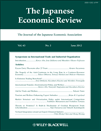
JAPANESE ECONOMIC REVIEW
Advancing insights into Japan's economic landscape.Japanese Economic Review, published by Springer Heidelberg, is a renowned academic journal that aims to advance the understanding of economic processes within the context of Japan and the Asia-Pacific region. With an ISSN of 1352-4739 and E-ISSN of 1468-5876, this journal features high-quality research articles that span a broad range of topics in economics and econometrics. Ranked in the Q2 category for Economics and Econometrics as of 2023, it holds a Scopus rank of #332 out of 716, placing it in the 53rd percentile among its peers. Although not Open Access, the journal invites contributions that provide insights and empirical analyses beneficial to both academics and practitioners. Emphasizing a deep understanding of economic dynamics, the Japanese Economic Review is essential reading for anyone interested in the implications of economic policies and trends, making it a significant platform for scholarly dialogue and research dissemination.

ECONOMIST-NETHERLANDS
Advancing Economic Insights Since 1852The Economist-Netherlands, published by Springer, is a prestigious journal that has been a cornerstone in the field of economics since its inception in 1852. With a strong focus on disseminating high-quality research and insights, this journal serves as an essential resource for economists, researchers, and practitioners interested in the dynamic landscape of economic theory and applications. Currently ranked in the Q3 category in Economics and Econometrics, this journal demonstrates a commitment to scholarly rigor, as reflected in its Scopus ranking within the 55th percentile. The journal features an extensive scope that encompasses key topics relevant to both historical and contemporary economic challenges, fostering a vibrant academic discourse. While access is not open, the journal remains a vital publication for anyone seeking to advance their knowledge in the economic sector. With an enduring legacy, the Economist-Netherlands continues to contribute significantly to the evolution of economic scholarship.
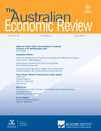
Australian Economic Review
Pioneering Research in the Heart of Australian Economics.Australian Economic Review, published by Wiley, serves as a vital platform for the dissemination of high-quality research in the field of economics and econometrics. With a rich history dating back to its inception in 1968 and continuing through to 2024, this journal holds a respectable position within the academic community, evidenced by its recent categorization in the Q3 quartile for its contributions to the subject area, and its Scopus rank of #432 out of 716 in the field. This makes it a noteworthy resource for researchers, academics, and professionals striving to stay at the forefront of economic discourse. While it does not currently offer open access options, the journal is committed to providing insightful analyses, empirical studies, and comprehensive reviews that cater to both theoretical and practical aspects of economic research. By fostering an environment for rigorous scholarship, the Australian Economic Review plays a crucial role in advancing understanding and innovation in the ever-evolving field of economics.
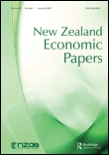
New Zealand Economic Papers
Advancing economic understanding in New Zealand and beyond.New Zealand Economic Papers is a prominent academic journal dedicated to the field of economics, published by Taylor & Francis Ltd. With its ISSN 0077-9954 and E-ISSN 1943-4863, this journal has been a significant contributor to economic discourse since its inception in 1966, continuing to provide valuable insights through to 2024. As part of the third quartile (Q3) in the Economics, Econometrics and Finance category, it ranks at #165 out of 288 in Scopus, placing it within the 42nd percentile, demonstrating its respectable impact in the academic community. Although the journal does not offer open access, it remains a vital resource for researchers, professionals, and students interested in understanding economic dynamics, policy analysis, and applied econometrics, particularly in the context of New Zealand. The journal's commitment to rigorous research ensures that it continues to play a crucial role in shaping economic policy and academic thought across the globe.

American Economic Journal-Economic Policy
Transforming Economic Research into Actionable PoliciesAmerican Economic Journal - Economic Policy, published by the American Economic Association, stands at the forefront of economic research, focusing on significant policy implications and evidence-based evaluations. With an ISSN of 1945-7731 and an E-ISSN of 1945-774X, this esteemed journal has maintained its influence and credibility in the field since its inception in 2009. Ranked in the Q1 category for Economics, Econometrics and Finance and ranking #7 out of 288 in Scopus, it boasts a remarkable 97th percentile ranking, making it a premier source for cutting-edge research and policy discussion. The journal's rigorous peer-reviewed articles aim to bridge the gap between academic research and real-world economic policy, serving as an essential resource for researchers, professionals, and students who seek to engage with and contribute to the evolving landscape of economic policy. With open access options not currently available, readers are encouraged to subscribe or access articles through academic institutions for comprehensive insights into the economic challenges and innovations shaping our world.
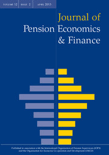
Journal of Pension Economics & Finance
Unraveling the Complexities of Pension SystemsJournal of Pension Economics & Finance, published by Cambridge University Press, is a pivotal resource for scholars and professionals immersed in the intricacies of pension systems, investment strategies, and the economic forces shaping financial security in retirement. Established in 2002, this esteemed journal focuses on cutting-edge research and theoretical insights that intersect the fields of Economics, Finance, and Organizational Behavior, boasting a commendable Impact Factor reflected in its Q2 ranking across multiple categories in 2023. With a diverse range of articles that inform both policy and practice, the journal serves as an essential platform for disseminating knowledge and fostering discussions that advance the understanding of pension economics and finance through rigorous analysis. Contributions are indexed in prominent databases, enhancing visibility and accessibility for interested researchers and practitioners in the global community. As such, the Journal of Pension Economics & Finance is a must-read for anyone dedicated to tackling the financial challenges and opportunities that prevail in pension management today.

Voprosy Ekonomiki
Advancing Knowledge in Business and FinanceVoprosy Ekonomiki, a well-established journal published by VOPROSY EKONOMIKI, NP, serves as a vital platform for dissemination of economic research and discourse in the Russian Federation and beyond. With a rich publication history dating back to 1978, the journal covers a broad spectrum of topics within the fields of Business, Economics, Finance, and History, reflecting its interdisciplinary nature. Notably, it holds a Q3 classification in major categories such as Business and International Management, Economics and Econometrics, and Finance, indicating its reputable standing in academic circles. While Voprosy Ekonomiki is not an open-access publication, it provides extensive insights that are instrumental to researchers, professionals, and students looking to enhance their understanding of economic theory and practice. With its inclusion in Scopus and commendable rankings in various disciplines, this journal proves to be an essential resource for those engaged in the dynamic study of economics.
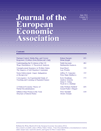
Journal of the European Economic Association
Navigating Complex Economic Challenges with Scholarly RigorThe Journal of the European Economic Association, published by Oxford University Press, stands as a cornerstone in the field of economics, boasting a strong impact factor that reflects its high citation rates and significance among peers. With an impressive Scopus ranking of 12 out of 288 in general economics, encompassing a remarkable 96th percentile, this journal is recognized for its rigorous peer-reviewed research contributions that advance the understanding of economic theory and policy. Dedicated to publishing innovative studies and theoretical advancements since its inception in 2003, it continues to engage scholars worldwide, providing vital insights applicable to both academia and industry. Although it does not follow an open-access model, the journal's extensive reach and commitment to excellence make it an essential resource for researchers, professionals, and students seeking to deepen their understanding of contemporary economic issues. Based in the United States, the journal reflects a European perspective on global economic challenges, making it indispensable for those at the forefront of economic research.

Economia-Journal of the Latin American and Caribbean Economic Association
Exploring New Frontiers in Latin American and Caribbean EconomiesEconomia - Journal of the Latin American and Caribbean Economic Association, published by LSE Press, serves as a vital platform for the dissemination of economic research pertinent to the Latin American and Caribbean regions. Since its inception in 1977, this Open Access journal has embraced an inclusive approach, ensuring that valuable insights are readily accessible to a global audience. With an ISSN of 1533-6239, Economia aims to highlight issues related to economic development, policy analysis, and international economics, making significant contributions to the fields of economics, political science, and international relations. It currently ranks in the Q4 category across several related fields, reflecting its emerging status in the academic discourse. The journal's commitment to fostering interdisciplinary dialogue is evident through its annual publications, making it an essential resource for researchers, professionals, and students eager to engage with contemporary economic challenges and innovations in the region.

Economics & Human Biology
Transforming Health Outcomes through Economic UnderstandingEconomics & Human Biology, published by Elsevier, is a prestigious journal that serves as an interdisciplinary platform at the intersection of economics and health sciences. With ISSN 1570-677X and E-ISSN 1873-6130, this journal analyzes the implications of economic factors on human health and biological outcomes. As a recognized leader in its field, it has earned a remarkable Q1 ranking in both the Economics, Econometrics and Finance (miscellaneous) and Health (social science) categories for 2023, reflecting its significant impact within the academic community, as evidenced by its Scopus rank of 88 out of 371 and a 76th percentile ranking in Health social sciences. Highlighting key issues such as health disparities, economic policy impacts on health, and the biological determinants of economic behavior, the journal encourages innovative research that bridges these critical domains. Researchers, professionals, and students seeking to contribute to or stay informed on emerging trends in health economics will find this journal an invaluable resource. Explore the latest findings and engage with a community dedicated to advancing our understanding of the interplay between economics and human biology.